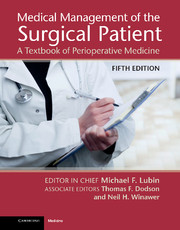Book contents
- Frontmatter
- Dedication
- Contents
- List of Contributors
- Preface
- Introduction
- Part 1 Perioperative Care of the Surgical Patient
- Part 2 Surgical Procedures and their Complications
- Section 17 General Surgery
- Section 18 Cardiothoracic Surgery
- Section 19 Vascular Surgery
- Section 20 Plastic and Reconstructive Surgery
- Section 21 Gynecologic Surgery
- Section 22 Neurologic Surgery
- Section 23 Ophthalmic Surgery
- Section 24 Orthopedic Surgery
- Section 25 Otolaryngologic Surgery
- Chapter 127 Otologic surgery
- Chapter 128 Tympanotomy tubes
- Chapter 129 Tonsillectomy and adenoidectomy
- Chapter 130 Surgery for obstructive sleep apnea
- Chapter 131 Endoscopic sinus surgery: indications, prognosis, and surgical complications
- Chapter 132 Aesthetic facial plastic surgery
- Chapter 133 Surgical treatment of head and neck cancer
- Chapter 134 Reconstruction after cancer ablation
- Chapter 135 Surgical management of thyroid malignancies
- Chapter 136 Anterior cranial base surgery
- Chapter 137 Acute airway emergencies
- Section 26 Urologic Surgery
- Index
- References
Chapter 137 - Acute airway emergencies
from Section 25 - Otolaryngologic Surgery
Published online by Cambridge University Press: 05 September 2013
- Frontmatter
- Dedication
- Contents
- List of Contributors
- Preface
- Introduction
- Part 1 Perioperative Care of the Surgical Patient
- Part 2 Surgical Procedures and their Complications
- Section 17 General Surgery
- Section 18 Cardiothoracic Surgery
- Section 19 Vascular Surgery
- Section 20 Plastic and Reconstructive Surgery
- Section 21 Gynecologic Surgery
- Section 22 Neurologic Surgery
- Section 23 Ophthalmic Surgery
- Section 24 Orthopedic Surgery
- Section 25 Otolaryngologic Surgery
- Chapter 127 Otologic surgery
- Chapter 128 Tympanotomy tubes
- Chapter 129 Tonsillectomy and adenoidectomy
- Chapter 130 Surgery for obstructive sleep apnea
- Chapter 131 Endoscopic sinus surgery: indications, prognosis, and surgical complications
- Chapter 132 Aesthetic facial plastic surgery
- Chapter 133 Surgical treatment of head and neck cancer
- Chapter 134 Reconstruction after cancer ablation
- Chapter 135 Surgical management of thyroid malignancies
- Chapter 136 Anterior cranial base surgery
- Chapter 137 Acute airway emergencies
- Section 26 Urologic Surgery
- Index
- References
Summary
Acute airway distress is a medical emergency that requires immediate treatment to limit morbidity and mortality. Airway distress arises from any process in the larynx, trachea, or bronchi that obstructs pulmonary ventilation. A wide variety of pathologic processes can result in airway distress. Management of patients experiencing acute airway distress depends greatly on the severity of distress as well as the specific etiology, but restoring adequate ventilation to the pulmonary system is the goal of all treatments. Oxygen administration, intubation, cricothyrotomy, and tracheotomy are all treatment options for patients in acute airway distress.
Differential diagnosis
Since the treatment of acute airway distress can depend greatly on the etiology of the problem, it is important to know the clinical presentation of different causes of airway distress. Interpreting both patients' presenting signs and symptoms in conjunction with physical examination, laryngoscopy when appropriate, and ancillary testing is essential to determine the etiology of obstruction and proper management. Causes of acute airway obstruction include infections, immunologic reactions, trauma, and foreign body obstruction.
- Type
- Chapter
- Information
- Medical Management of the Surgical PatientA Textbook of Perioperative Medicine, pp. 782 - 786Publisher: Cambridge University PressPrint publication year: 2013



